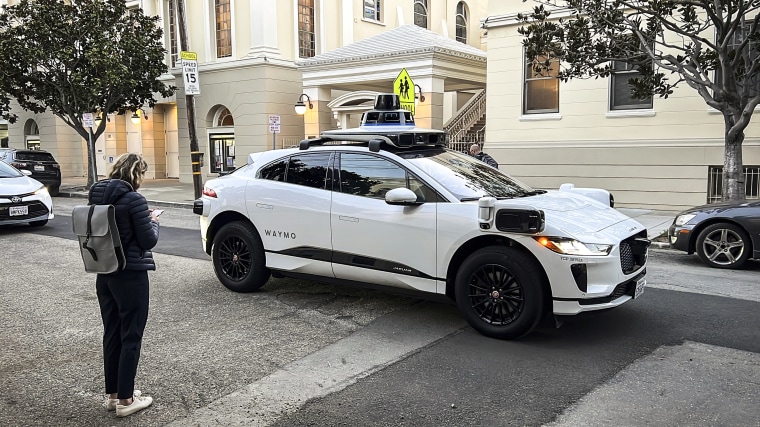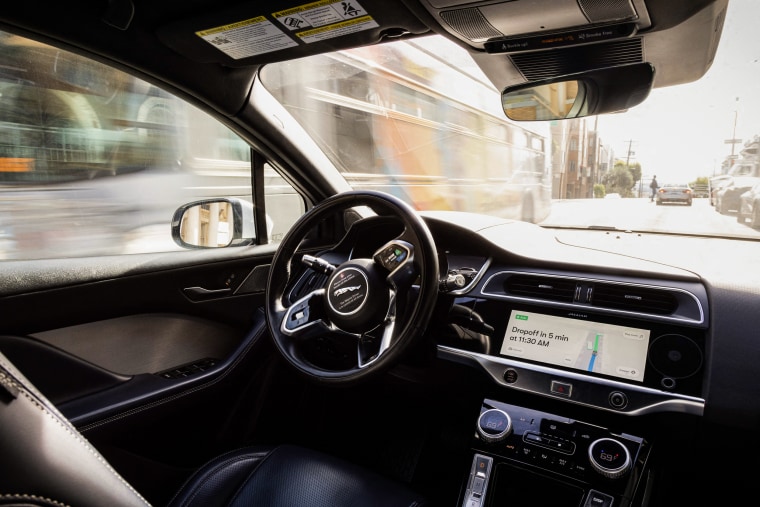Some labor unions, including the Teamsters, plan to push back against a plan by the self-driving car company Waymo to expand its autonomous car service in California.
The Teamsters and three other labor organizations are planning a rally Friday on the steps of Los Angeles City Hall to call for stricter regulation of driverless cars, which they say threaten the jobs of people who drive for a living. The Teamsters say they want autonomous car services to have backup human drivers, and they’re supporting a bill in the California Legislature that would grant cities and counties the authority to regulate or block services such as Waymo’s.
Waymo, which operates fleets of autonomous cars for hire in San Francisco and Phoenix, announced plans last month to expand to two additional swaths of California: parts of greater Los Angeles and suburban towns south of San Francisco. The company, which spun off from Google in 2016, said it has more than 50,000 people on its Los Angeles waitlist for free test rides.
The service is similar to the ride-hailing apps Uber and Lyft, but the Waymo vehicles are driven by self-driving software, with no humans behind the wheel. Waymo employees are available for remote assistance if needed.

Lindsay Dougherty, the Teamsters’ vice president for the western region, said in an interview that automation in driving is a long-term threat to union jobs such as truck driving and package delivery. The Teamsters represent driving workers at some companies like UPS.
“It’s definitely an issue for working people in general but most definitely the Teamsters, who do represent drivers,” she said. “The ultimate fear of our members is losing these jobs.”
Dougherty also said she’s not convinced that the Waymo service is safe. She said she hasn’t ridden in one and wouldn’t unless a backup human driver was present.
“Any vehicle is a weapon, essentially. It is a piece of machinery that can harm not just other drivers but pedestrians,” she said. “I just don’t trust the technology.”
Self-driving cars have been involved in high-profile deaths. In 2018, a self-driving Uber car with a backup human driver struck a pedestrian in Arizona, killing her. Tesla’s driver assistance system, known as Autopilot, has been associated with 17 deaths, The Washington Post reported last year.
Waymo has said its safety record is far better that than of human drivers, with no traffic deaths and only minor injuries. And even those minor injuries are generally caused not by the Waymo vehicles but by human drivers in other vehicles who fail to stop and then rear-end Waymos, according to the company and documents it has filed with state regulators.
Traffic deaths caused by human drivers are at or near multidecade highs, having surpassed 42,000 in 2022, according to federal regulators.
Waymo vehicles are generally more observant of traffic laws than human drivers are, according to journalists who have ridden in them in San Francisco: They obey speed limits, use turn signals and make full stops at stop signs.
A Waymo representative had no immediate comment Thursday on the labor opposition.
In a statement last month, Waymo said the regulatory process it follows is already rigorous.
“We remain committed to our safety-driven, community-first deployment approach that has served our riders well in San Francisco and Phoenix,” it said. “We look forward to public feedback over the coming months, and continuing our ongoing dialogue with officials and community organizations in LA.”
Last year, the Teamsters supported legislation in California to require backup human drivers for semiautonomous trucking services. The bill passed the Legislature, but Gov. Gavin Newsom, a Democrat, vetoed it, saying it wasn’t necessary to ensure safety.
Friday’s rally in Los Angeles is scheduled to include representatives from three other labor organizations: the Los Angeles County Federation of Labor, the California Professional Firefighters and the California Labor Federation.
Some labor unions have supported autonomous taxis. Last year, Cruise, a division of General Motors, said it had signed agreements with two local union chapters in San Francisco that represented electrical workers and janitors at Cruise’s facilities. California later revoked Cruise’s permits to operate in the state, accusing the company of having failed to disclose details about a collision involving a pedestrian.
To move forward with its planned expansions in California and begin charging the public for rides in new areas, Waymo first needs permission from state regulators. Under state law, it doesn’t need the permission of local authorities, but the Teamsters and others support legislation to change that.
State Sen. Dave Cortese, D-San Jose, is sponsoring legislation that would give cities and counties authority over services like Waymo’s. He said it doesn’t make sense for them to be cut out of the process when they already regulate local taxi services.
“We’re really trying to return local control to the cities and counties in terms of motor vehicle oversight and basic street safety regulations,” he said in a phone interview. “The state shouldn’t have absolute control.”
The bill would give localities wide authority over autonomous vehicle services, including the ability to cap the number of vehicles depending on their impact on congestion.
Like Dougherty, Cortese said he hasn’t ridden in a Waymo and isn’t convinced they’re safe. He said lawmakers and the public are “completely dependent” on the company and its competitors to self-report any incidents.
“What they’re asking for is the equivalent of Henry Ford establishing his assembly line and selling his Model T, and the government says, ‘Go ahead and do what you want, because it’s probably safer than a horse and buggy.’ We’ve never operated that way,” Cortese said.
“I know that’s not the sentiment of my constituents — at least the majority of them,” he added.
